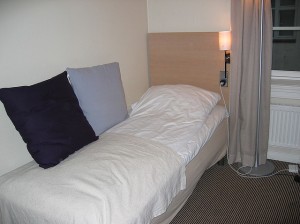Everyday Norwegian Posted by Bjørn A. Bojesen on Mar 30, 2014 in Uncategorized

In Scandinavia, people sleep underneath ”pillow-ish” dyner (duvets, sleeping quilts) rather than blankets.
(”Senga mi med ei norsk dyne” by aarsvoln on Flickr, licenced for commercial use according to https://creativecommons.org/licenses/by/2.0/ )
How do I get to Preikestolen? How much is the entrance to Kon-Tiki Museet? Language courses are often geared towards tourists and travelling. However, if you really want to speak like a native, you also need words for all the little things you do every day:
Du står opp tidlig eller sent. (You get up early or late.) Most probably you’re in a seng on a pute (pillow) below a dyne (duvet) when vekkerklokka ringer (the alarm clock rings).
Du tar en dusj. (You take a shower.) Du vasker håret med sjampo. (You clean your hair with shampoo.) Du tørker deg selv med et håndkle. (You dry yourself with a towel.) Du klær på deg. (You put on clothes.) Du grer håret med en kam eller en børste. (You comb your hair with a comb or a brush.) Maybe you also sminker deg selv (put on make-up) or barberer deg selv (shave yourself).
Du spiser frokost. (You eat breakfast.) Maybe you eat alene, or maybe you eat sammen med familien din (together with your family). Du vasker opp (you do the dishes) – or: Du starter oppvaskmaskinen (you start the dishwasher). Du børster tenner (you brush your teeth), with a bit of tannkrem (toothpaste) on a tannbørste (toothbrush), which may or may not be elektrisk (electric, motorized).
Du sier ”ha det” til familien din eller katten din. (You say goodbye to your family or your cat.) Du kjører bil/sykler/tar bussen/tar trikken til arbeid eller skole. (You drive your car/go by bicycle/take the bus/take the tram to work or school.) Maybe you need to stop by a bensinstasjon (filling/gas station) in order to fylle opp tanken (refuel). Du jobber/studerer. (You work/study.) Du tar en pause. (You take a break.) Du spiser lunsj/matpakken din. (You eat lunch/your packed lunch.) Du drikker kaffe/te/melk. (You drink coffee/tea/milk.) Du snakker med kollegaene dine/de andre elevene/de andre studentene. (You talk to your colleagues/the other pupils/the other students.) Du drar hjem. (You go home.)
On your way you make a stop at the kjøpesenter (shopping mall), where you handler litt (do some shopping). Du betaler med Visa-kortet ditt. (You pay with your Visa card.) Du legger varene i pastposer. (You put your items into plastic bags.)
Du hilser på familien din eller katten din. (You say hello to your family or your cat.) Du lager middag. (You make dinner.) Du spiser middag. (You eat dinner.) Du rydder bordet. (You clean the table.) Maybe you’ve got lekser (homework) or husarbeid (chores) to do. It may be time to klippe plenen (mow the lawn), male huset (paint the house), støvsuge (vacuum) or vaske klær (wash clothes). Maybe you go out to møte venner (meet friends). Maybe you stay at home with your family, ser tv (watch tv), leser bøker (read books) or spiller spill (play games). Sooner or later it will be time to legge seg (go to bed, literally ”lay oneself down”). Kanskje må du legge barna først, og lese en godnatthistorie for dem. (Perhaps you need to tuck in the children first, and read them a bedside story.) Du kryper under dyna. (You snuggle down in bed. Literally: You crawl below the duvet.) Du sover. (You sleep.) Hopefully, you’re having some wonderful drømmer (dreams), so you’ll feel refreshed and energized for a new bustling dag (day)!

Build vocabulary, practice pronunciation, and more with Transparent Language Online. Available anytime, anywhere, on any device.
About the Author: Bjørn A. Bojesen
I was born in Denmark, but spent large parts of my childhood and study years in Norway. I later returned to Denmark, where I finished my MA in Scandinavian Studies. Having relatives in Sweden as well, I feel very Scandinavian! I enjoy reading and travelling, and sharing stories with you! You’re always welcome to share your thoughts with me and the other readers.



